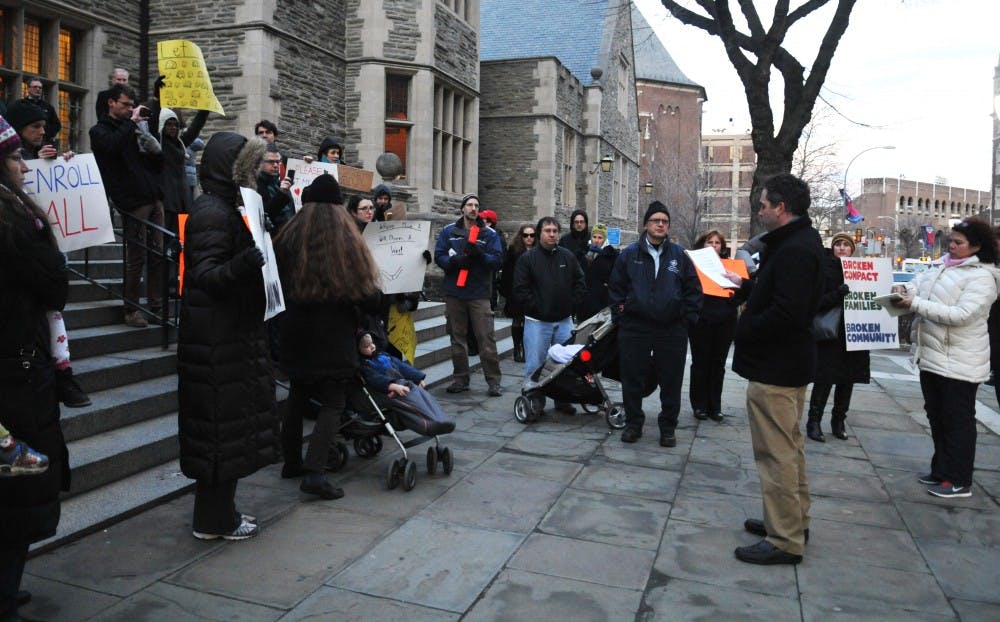
Demonstrators gathered in the freezing cold Wednesday afternoon on the steps of Houston Hall to protest the results of the lottery registration at the Penn Alexander School.
Out of the 88 students who registered for kindergarten at PAS — a school in West Philadelphia formed 14 years ago in a partnership between Penn, the School District of Philadelphia and the American Federation of Teachers — 10 were waitlisted following a lottery held behind closed doors.
The demonstration was set for 5:30 p.m. in order to coincide with the University Council meeting going on in Houston Hall.
“Am I supposed to accept that a computerized lottery waitlisted my daughter at her neighborhood school?” Eric Santoro, a neighborhood parent, said in a speech before the crowd.
Roughly 30 parents, children in tow, stood outside the entrance holding signs that read “enroll all,” “10 more in” and “broken compact = broken community.” PAS is emphasized in Penn President Amy Gutmann’s Penn Compact.
The Division of Public Safety placed four armed plainclothes police officers at the entrance to Bodek Lounge in Houston Hall.
“We are just monitoring,” Deputy Chief of Investigations for the Division of Public Safety Michael Morrin said. “We’re making sure that people’s rights are protected and everybody gets to have their say.”
Joanne Murray, an Open Expression Monitor from the Penn Committee on Open Expression, was also on hand to make sure that the rights of both the University Council and the demonstrators were respected.
Murray is the assistant dean at the Annenberg School for Communication and volunteers as an impartial observer at events where First Amendment rights violations might occur.
“You wonder who the audience is,” Murray said as the cars sped past the little group of demonstrators gathered on the steps of Houston.
Murray added that she was able to empathize with the demonstrators as a parent herself but that ultimately, “the school district made the call.”
“When you implement a lottery you create the most challenging situation for the families in the catchment zone,” Santoro, the parent, said.
Throughout his speech, there were shouts and murmurs of approval.
“Let us help you find a way to enroll 10 more children at the Penn Alexander School,” Santoro concluded.
As the protest occurred outside, Mike McGarvey, an associate professor of neurology at the Perelman School of Medicine, was addressing the council meeting that night on the question of “Penn’s commitment to the faculty, staff, students and alumni who live in [the] Penn Alexander catchment area.”
The demonstrators started the evening by attempting to yell slogans through the windows of Bodek Lounge.
When McGarvey told them there were other speakers at the council meeting, the demonstrators relocated to the steps.
McGarvey has a 4-year-old son whom he was able to register at PAS, but he still felt “guilty about the line and guilty about the lottery,” so he decided to speak at the meeting.
He cited former Penn president Judith Rodin’s vision in her book “The University and Urban Revival,” saying, “clearly Dr. Rodin didn’t want a lottery.”
“The reasons were twofold,” he said. “One, they were concerned about fraud, and two, they wanted all the students in the catchment to go to the school.”
“Don’t get me wrong — I love Penn. I love everything about it,” McGarvey said. “But I’m torn.”
He said as a doctor he was concerned about his resident, a graduate student in the Medical School, whose child was waitlisted at PAS.
“I’m going to have to sit down and look at my resident every day knowing my child got in, and hers didn’t.”
The Daily Pennsylvanian is an independent, student-run newspaper. Please consider making a donation to support the coverage that shapes the University. Your generosity ensures a future of strong journalism at Penn.
DonatePlease note All comments are eligible for publication in The Daily Pennsylvanian.







